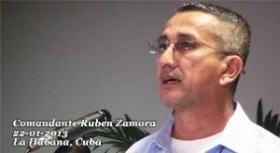 In peace talks in Havana Tuesday, Colombia’s FARC guerrillas called on the Colombian government to consider legalizing coca cultivation. The proposal was part of the FARC’s broader proposal on agrarian development and land reform.
In peace talks in Havana Tuesday, Colombia’s FARC guerrillas called on the Colombian government to consider legalizing coca cultivation. The proposal was part of the FARC’s broader proposal on agrarian development and land reform.
The proposal came one day after the FARC ended its self-imposed cease-fire (the Colombian government never agreed to a cease-fire during the peace talks) and launched a series of attacks on security forces, leaving at least one soldier dead.
The FARC is a socialist político-military formation that has been in rebellion against the central government in Bogota since 1964. Its military strength seems to have peaked about a decade ago, but it remains a potent forcé in some sectors of rural Colombia.
After first opposing the cultivation of coca among the peasantry, it gradually shifted to supporting and taxing it, and the group has had some involvement in the cocaine trade as well. Colombia is either the world’s largest or second largest coca and cocaine producer, depending on which figures you believe. That’s despite more than $7 billion in US anti-drug and counterinsurgency assistance since 1999 and massive, years-long aerial fumigation campaigns.
In its agrarian reform proposal, FARC negotiator Rube Zamora called on the government to “contemplate actions regarding the cultivation of illicit crops to transition toward substitute or alternative production or for their legalization for medicinal or therapeutic ends or cultural reasons.”
More broadly, the FARC called for the creation of a “land bank” of unused or underused areas that could be distributed to landless peasants and for a more democratic method of rural planning. The land would include “latifundia,” or large rural estates, confiscated from drug traffickers. The proposal marks a retreat from the previous FARC position that called for the seizure and redistribution of all latifundia.
There is no word on the Colombian government’s response to the proposals. Both parties in the talks have agreed not to talk publicly about their progress. They restarted Tuesday after going on hiatus for the Christmas holidays.
Article republished from Stop the Drug War under Creative Commons Licensing









